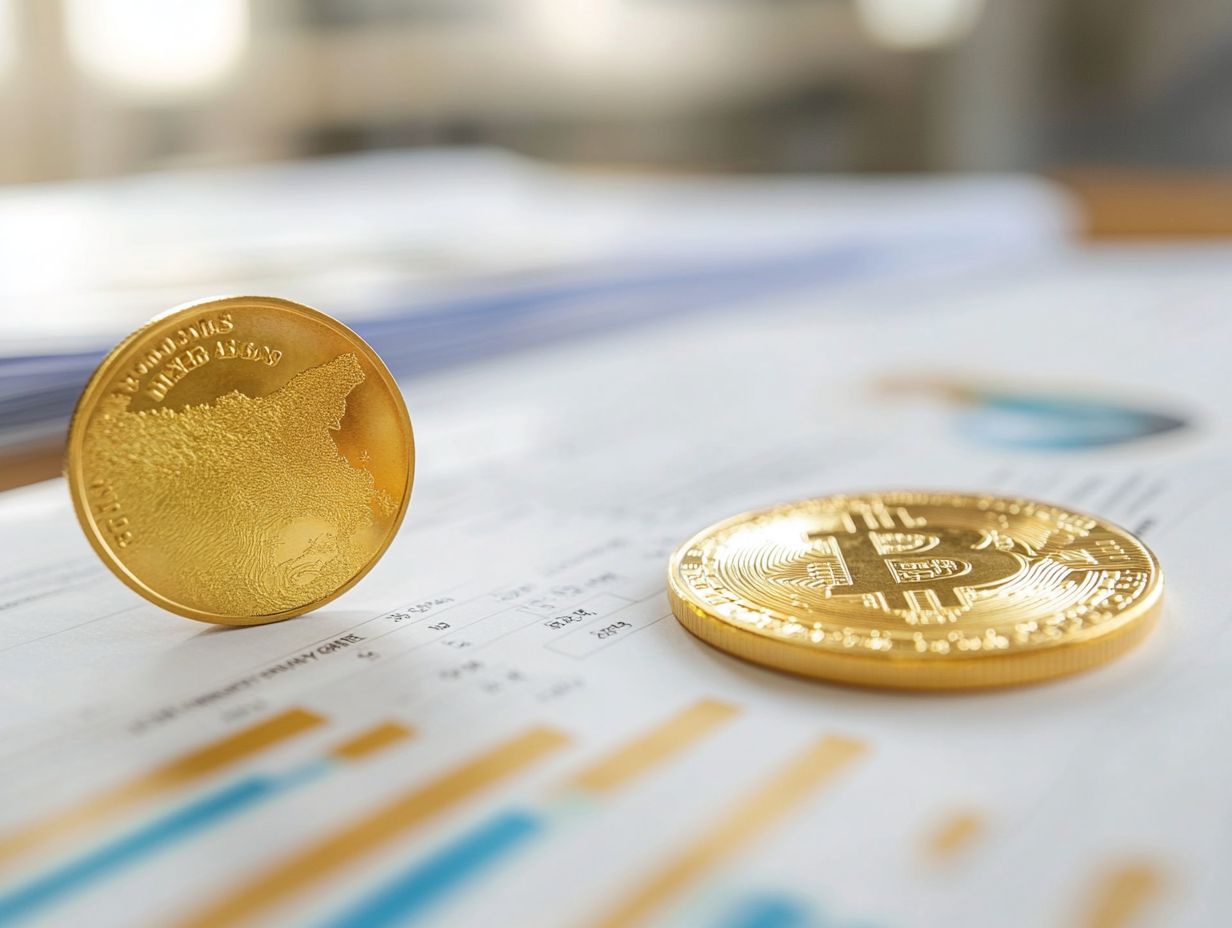How to Stay Compliant with Precious Metals Tax Laws
Navigating the world of precious metals is undeniably thrilling, yet understanding the tax laws may seem daunting.
Whether you’re dealing in gold bullion or silver coins, your investments carry specific tax obligations that are essential to comprehend.
This article will break down the pertinent laws and regulations, clarify your tax responsibilities, and present best practices to ensure you remain compliant.
You ll also explore the potential consequences of non-compliance.
Stay informed to protect your investments!
Contents
- Key Takeaways:
- Understanding Precious Metals Tax Laws
- Tax Obligations for Precious Metals
- Tips for Staying Compliant
- Consequences of Non-Compliance
- Navigating Complex Tax Situations
- Frequently Asked Questions
- What are the tax laws surrounding precious metals?
- How do I determine the value of my precious metals for tax purposes?
- Are there any tax deductions or exemptions for owning precious metals?
- What are the consequences of not staying compliant with precious metals tax laws?
- What documents do I need to keep track of for tax purposes?
- How can I ensure I am staying compliant with precious metals tax laws?
Key Takeaways:

- Stay informed: Understand the relevant laws and regulations governing precious metals taxes to avoid penalties and legal consequences.
- Fulfill your obligations: Know the types of taxes and what you need to report for precious metals to ensure compliance and avoid potential issues.
- Maintain accurate records: Implement best practices for record-keeping and reporting to navigate complex tax situations, including international transactions.
Understanding Precious Metals Tax Laws
Understanding the tax laws regarding precious metals like gold, silver, and platinum is essential for you as an investor aiming to elevate your portfolio while navigating the intricate maze of IRS guidelines and regulations. These valuable assets can serve as a robust hedge against inflation and economic uncertainty.
Understanding this is critical for your success as you need to know about capital gains, which is the profit you make from selling an asset for more than you paid, tax implications, and reporting requirements. Whether you re a short-term trader or a long-term strategist, familiarizing yourself with the current tax landscape is essential.
By doing so, you can make informed decisions that not only optimize your financial growth but also help reduce your tax liability.
Tax Obligations for Precious Metals
Investors in precious metals encounter distinct tax obligations that can profoundly influence their financial strategies, particularly concerning capital gains taxation on valuable assets such as gold and silver coins and bullion.
It’s crucial to understand the differences between short-term and long-term gains, as these are subject to different tax rates based on your holding periods and IRS classifications.
Since precious metals are frequently classified as collectibles, they carry unique tax implications compared to other investment vehicles. Therefore, it’s vital to fully comprehend your tax obligations to navigate this intricate landscape effectively.
Types of Taxes and Reporting Requirements
When investing in precious metals, it s crucial to grasp the various types of taxes and what you need to report. This knowledge is key to maintaining compliance with IRS regulations and ensuring your tax returns are accurate.
You need to be aware of capital gains taxes that apply to your sales of precious metals and understand when to report these using forms like Form 1099-B and Schedule D.
Proper documentation of your transactions is vital, as it reflects any taxable events that may arise from buying or selling gold, silver, or other precious metals.
Recognizing the distinction between short-term and long-term capital gains is also important, as this can significantly affect your tax obligations. If you hold your investments for more than a year, you may benefit from a lower long-term capital gains tax rate.
Form 1099-B helps in reporting your sales proceeds, while Schedule D assists in calculating overall gains and losses.
By familiarizing yourself with these forms and their requirements, you will be better equipped to file precise tax returns, thereby minimizing the risk of underreporting or misreporting your earnings.
Tips for Staying Compliant

Staying compliant with tax laws while investing in precious metals requires careful record-keeping and a commitment to best practices. This approach can greatly reduce your potential tax liability.
Adopt systematic methods to document your transactions. Ensure you maintain accurate cost basis records, receipts for purchases, and detailed notes on any sales.
Consulting with a tax professional who specializes in precious metals can provide invaluable insights into compliance matters, potential tax deductions, and effective strategies to navigate the intricacies of tax obligations.
Best Practices for Record-Keeping and Reporting
Implementing best practices for record-keeping and reporting can enhance your ability to meet IRS requirements while managing your investment portfolio in precious metals.
Diligently record each transaction, detailing sales and costs associated with buying or selling. This enables you to track fluctuations in fair market value over time and minimizes the risk of errors during tax season.
Keep copies of invoices and receipts as crucial backup documentation in case any questions arise regarding tax implications. This practice fosters transparency and instills confidence in your reporting.
Consequences of Non-Compliance
The consequences of not adhering to tax laws surrounding precious metals can be severe. This may lead to significant penalties and potential legal issues that could jeopardize your financial stability.
If you fail to accurately report capital gains on your tax returns, you risk increasing your tax liability and inviting audits from the IRS. Such audits might uncover discrepancies that complicate your financial situation.
Understanding these risks is essential for anyone engaged in precious metals investing to remain compliant with regulations and safeguard investments.
Potential Penalties and Legal Ramifications
Investors who fail to comply with IRS regulations regarding precious metals may face significant penalties and legal consequences. This includes hefty fines and the threat of tax evasion charges.
The IRS monitors compliance closely, and any discrepancies could result in costly repercussions that jeopardize your financial future. Understanding these penalties is crucial to protect your investment!
Every year, the IRS enforces strict reporting requirements. Simply being unaware of these rules can lead to substantial financial losses. Non-compliance could result in fines that soar into the thousands, along with interest on unpaid taxes. In extreme cases, individuals might even face criminal prosecution, which could bring about even graver consequences.
Therefore, as an investor, stay well-informed about your obligations. Keeping accurate records and diligently reporting all transactions will help mitigate the risk of audits and penalties. By recognizing these potential pitfalls, you can navigate the complexities of tax obligations more effectively and protect your investments.

Managing your taxes can be tricky, especially within the realm of precious metals investments. It demands a sophisticated understanding of tax implications that can vary based on several factors, including international transactions.
As an investor in gold and silver across borders, familiarize yourself with both domestic and foreign tax regulations. This knowledge is essential to comply with the IRS and avoid unexpected liabilities.
Craft effective tax strategies that address these complexities. This is crucial for maximizing your financial outcomes and minimizing risks.
Special Considerations for International Transactions
When you venture into international transactions involving precious metals, it is essential to be fully aware of the additional IRS regulations and tax implications that differentiate these transactions from domestic ones. Compliance with both U.S. laws and the regulations of other countries is crucial for avoiding potential legal pitfalls and financial penalties.
Understanding how international tax laws intersect with your U.S. tax obligations is vital for thriving in global markets. Pay close attention to the reporting requirements for foreign accounts and the specific classifications of precious metals, as these details can significantly influence how your transactions are taxed, including the tax implications of selling your precious metals collection.
Be mindful of nuances such as capital gains tax, which can vary dramatically from one country to another and requires a careful review of tax agreements between countries. Neglecting to navigate these regulatory challenges can lead to serious repercussions, including audits or penalties from the IRS.
Stay informed about compliance frameworks across different jurisdictions. This knowledge will help you meet all necessary obligations and maximize your investment potential.
Frequently Asked Questions
What are the tax laws surrounding precious metals?
The tax laws surrounding precious metals can vary depending on your location. In the United States, the IRS considers precious metals to be collectibles and taxes them at a maximum rate of 28%.
How do I determine the value of my precious metals for tax purposes?

The value of your precious metals for tax purposes is based on the fair market value, which is the price that a willing buyer and seller would agree upon. This value can fluctuate, so it is important to stay up-to-date with market prices.
Are there any tax deductions or exemptions for owning precious metals?
Unfortunately, there are no tax deductions or exemptions specifically for owning precious metals. However, certain investment strategies and structures can help minimize tax liabilities.
What are the consequences of not staying compliant with precious metals tax laws?
If you fail to comply with precious metals tax laws, you could face penalties and fines from the IRS. In extreme cases, there may also be criminal charges. Staying compliant is crucial to protecting your investments!
What documents do I need to keep track of for tax purposes?
You should keep track of any purchase or sale receipts, as well as any other documentation related to your precious metals transactions. This will help you accurately report your gains or losses for tax purposes.
How can I ensure I am staying compliant with precious metals tax laws?
To ensure compliance, it is recommended to consult with a tax professional or financial advisor who is knowledgeable about precious metals tax laws. They can help you understand your obligations and ensure you are meeting them.
For more information, consider reaching out to a tax specialist to navigate the complexities of precious metals investments.













